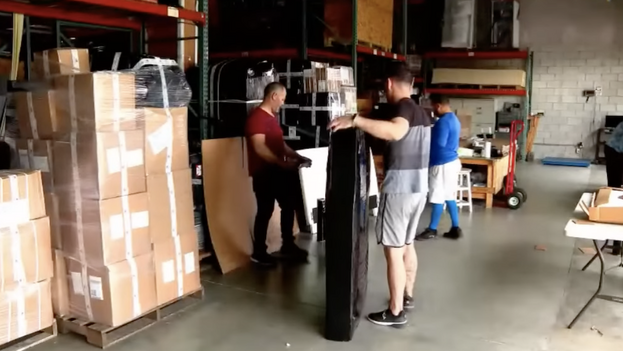
![]() 14ymedio, Madrid, 27 April 2023 — The company Apacargo Express, based in Miami, has obtained a license to export new and used cars, trucks, trailers, tractors and agricultural equipment to Cuba, according to Univision 23 journalist Mario Vallejo.
14ymedio, Madrid, 27 April 2023 — The company Apacargo Express, based in Miami, has obtained a license to export new and used cars, trucks, trailers, tractors and agricultural equipment to Cuba, according to Univision 23 journalist Mario Vallejo.
The authorization, 10 million dollars, was approved by the Office of Foreign Assets Control (OFAC) of the US Treasury Department as an exemption from the embargo. As a condition, the sale must be to private entrepreneurs and, in no case, to the State.
“At the moment it is aimed at small and medium-sized companies [SMEs] so that they can import cars for their use,” Eduardo Aparicio, owner of the authorized business, told the reporter.
He explained that there is a high demand, and the first step is to ask the importing company for a budget to know what the final value of the operation will be. Aparicio said that Cuban customs does not charge many taxes, but it is expensive to pay the importing company, which is asking for around 30% of the value of the vehicle invoice.
Based on other experiences such as those of cargo companies, he said it is “quite manageable.” According to Aparicio’s example, “6,000 dollars of taxes and about 10,000 dollars for logistics and documentation should be added to a $20,000 car.”
“It’s obvious that the embargo exists, but if we have flexibility from the Department of Commerce to do these deals with Cuba, I think it’s the way to do something different that may lie ahead in the near future,” he said.
Aparicio has spent years obtaining licenses from OFAC to do business in Cuba. According to the website of the company, founded in 2015, it offers consulting services, legal and economic advice, planning and monitoring of business trips, air tickets, hotels, internal transport, translation and development of business plans.
Last October, the U.S. Office of Industry and Security approved an exclusive license in favor of the Premier Automotive Export distributor, based in Columbia, Maryland, for the export of motorcycles and electric skateboards, news that was as celebrated as it was criticized by Cubans on and off the Island.
On this occasion, the initial reactions have been mostly mockery. At a time of fuel shortage, with vehicles lining up for days to try to refuel at gas stations, the acquisition of a car is not among the priorities of many Cubans. “But how are they going to work if there is no oil, gasoline or water there?” one user reproached. Others reacted with humor: “Let them get a Tesla because how are they going to find gas?”
There was also no shortage of several commentators who demanded food shipments rather than vehicles and those who distrust that, despite the restrictions, the Miami cars will not finally end up in the hands of the regime: “They are sent to the self-employed and then the State confiscates them and passes them into the hands of the Government.”
Translated by Regina Anavy
____________
COLLABORATE WITH OUR WORK: The 14ymedio team is committed to practicing serious journalism that reflects Cuba’s reality in all its depth. Thank you for joining us on this long journey. We invite you to continue supporting us by becoming a member of 14ymedio now. Together we can continue transforming journalism in Cuba.
